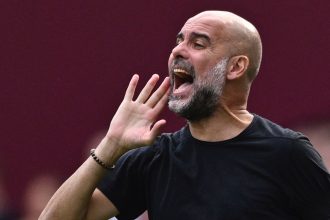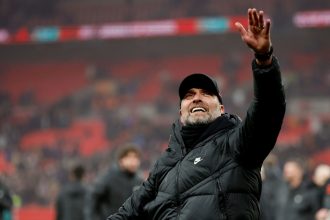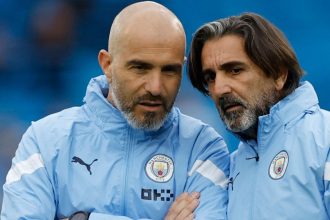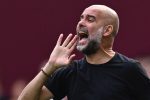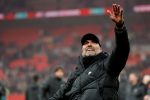The Argentine head coach has made questionable tactical decisions of late, and should shoulder blame for the Herons' sluggish stretch
Even Sergio Busquets got it wrong. It was halfway into the second half of Inter Miami's clash with Orlando City Sunday night, and the Herons were starting to look desperate. Lionel Messi took extra touches. Luis Suarez – who cannot really dribble past anybody – tried to dribble past everybody. Jordi Alba threw in arms in frustration when he didn't receive the ball.
And most glaringly of all, Busquets forgot how to pass. The legendary defensive midfielder swiveled his hips, turned towards the goal, and tried to find that signature pass into Messi's feet. It's a ball he has played hundreds, if not thousands of times, in his career. Instead, it went straight to the feet of an Orlando City defender.
It was a moment emblematic of where Miami are right now. There's too much going on. It's too frantic, too, well, messy. The Herons are all about control, and they have lost it. One win in seven games is bleak. Getting beat, 3-0, by your rivals at home sums it all up.
There are some, in the darker corners of social media, starting to call for manager Javier Mascherano's job. This, of course, is the natural flow of the sports landscape. A team does bad things and the coach is to blame. Changing the coach, at this point, would be foolish. Miami are in the midst of a bad run, but probably have the talent to play their way out of it – and the financial resources to make use of the transfer market if things get worse.
Still, in recent weeks, it has become clear just how inexperienced Mascherano is on the touchline. In times like these, teams need a true leader at the center of everything who can tweak his system and grind out results. Right now, it all looks like a deferential friend of his star players trying to trust that his team is simply good enough to improve – rather than taking an honest look at his side and adjusting.
Getty Images SportLosing, home and away
Zoom out, and Miami really haven't been that good for a while. In a sense, you can trace their struggles back almost seven months, to the first round of the 2024 MLS playoffs. That 2-1 series loss to Atlanta came with a fair few asterisks – injuries in defense, Brad Guzan turning into prime Manuel Neuer, a manager worryingly out of his depth – but the same problems have persisted.
The Herons are still easily hit on the break. They still rely heavily on aging superstars. They still play with too much emotion, and lack control.
One win in seven is basically all of that coming to a head. There is such a thing as the new manager bounce, and Miami enjoyed it in full. The early days of Mascherano's reign were marked by the legendary Argentine saying all of the right things, and working a few new signings into the fray effectively. Miami were solid enough early on, and could simply outscore opponents when they needed.
They conceded three times in their first six games, and found the net 14 times over that period. Throw in a 2-1 win over Philadelphia Union on March 29, and a dramatic CONCACAF Champions Cup comeback over LAFC a week later, and the vibes were good.
But more recently, they have been found out a bit. The weaknesses were always there. But teams are now brave enough to exploit them. FC Dallas were the first to have a real go. The Texas side simply went after a Messi-less Miami on April 29, and overturned a deficit at Chase Stadium en route to a 4-3 win.
Since then, things have quickly gone downhill. Messi has been visibly frustrated, both at his teammates and MLS referees. Miami haven't won since May 3, and are out of the CONCACAF Champions Cup – deservedly done away with by an excellent Vancouver side.
AdvertisementGetty Images SportHow Orlando City beat Miami
Mascherano's response against Orlando was to get groovy. He deployed Alba, a natural full back, at left wing. Noah Allen, a left footed center back, slotted in on the left side on defense, and then tucked into the midfield when Miami had the ball.
In fairness, his selection made sense. Alba is at his most effective in the final third, and these days doesn't have the legs to scurry up and down the wing. Strip it down, and when you start a player in his best position, it tends to work out – even if he had played just eight(!!) minutes as a left winger in more than 600 appearances in professional soccer.
There is one issue, though: it didn't work. Alba was 0/7 in crosses, and spent most of his time wandering in central areas. When the ball was on the right, he drifted into the center. This was not the touchline-hugging outside back who could provide those famous diagonal balls into Messi that once ran up and down the side of the Camp Nou pitch. There was a clear knock on effect, too, Allen looking visibly lost at times when Alba went for a saunter.
Combine that with a sordid looking Suarez just trying things for the sake of it, Messi failing to find the killer ball, and Yannick Bright enduring a rare off day in central midfield, and all of the pieces for a home upset were firmly in place.
AFPA tactical model that isn't working
After the game, Mascherano insisted that he bears the blame.
"Clearly the one responsible is me, I’ve said that before," he said. "We can’t afford the kinds of mistakes we’re making. That’s been clearly identified, but there’s no use in me coming here and repeating it – because it keeps happening. In many of these aspects, we’re failing as a coaching staff, and we have to find a way to stop making these mistakes so that the team can start getting results."
Well, credit the man for some self awareness. Mascherano's team selection was fine. His Alba experiment was intriguing. His trust in Tadeo Allende to cover ground over Benjamin Cremaschi was understandable.
But what he should absolutely take the blame for is trying to utilize a system that simply does not work with this squad. Mascherano has insisted that Miami will play with a high line, try to win the ball in the final third, and catch opponents offside. In a very, almost too generous sense, that adds up.
Miami want to have the ball. They are good when they have it, and have some individuals who can offer the legwork to make it happen. An interesting – if slightly imperfect – comparison is Argentina, who do most of the same. They won the 2022 World Cup.
But there is a key difference here: Miami simply do not have the athleticism or defensive smarts to make it all happen. Playing a high line requires that the three lines – defense, midfield and attack – are as compact as possible, and apply constant pressure on the ball. It also requires that the back four move perfectly in unison and have the recovery pace to regroup if the system is bypassed.
Well, Busquets is older and has never been able to move particularly quickly. Messi and Suarez are passengers at this point. Alba has to save his legs. That removes four players from the system.
And then, there's the defensive line, which has been pretty miserable. Offseason acquisition Maxi Falcon, supposedly the veteran center-back of this side, brutally lacks composure and is far too often caught out of position. Gonzalo Lujan is strong in his one-on-ones, but is more of a distributor than elite defender.
Meanwhile, Ian Fray and Noah Allen are young, and simply need to be shepherded through games. Put all of that together, and Miami concede the same goal, over and over again – their press is broken, and a pass either through or over the defense allows an opponent to run through on goal. Mascherano must look at this and think a version of "I fancy myself at center-back here."
Getty Images SportThe potential solutions
There are a number of possible solutions here. The first is to boldly continue what they are doing tactically, and tinker with personnel. Perhaps Cremaschi can be used more effectively. Maybe Telasco Segovia is the key. It is entirely possible, too, that Miami will win any given game because of the guy wearing the No. 10 jersey throughout. "Messi and vibe" is not a sustantainable strategy, but can be enough at times – see the 2022 World Cup for more.
The other is to switch things up. Miami might need to defend a little deeper, absorb pressure when they can, and try to play more expansive attacking football on the break. That could be something of a dangerous proposition for Messi, Suarez and the older heads, but it might offer defensive solidity.
Doing that for a few games, especially at next month's Club World Cup, would not only pick up a few more results, but also help this side settle a bit. Sure, Mascherano might take some heat for winning ugly. Still, it could be shrewd to get the team on track (and has been the making of many big name coaches in the past).
